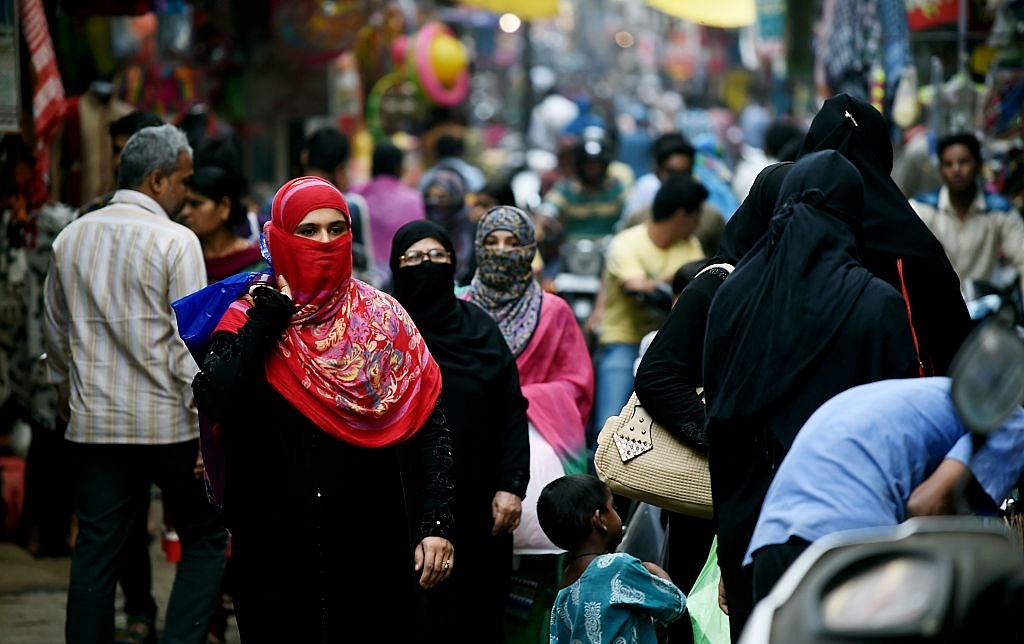Ideas
Why There Is Little Logic In Treating Muslims As Minorities In India
- Trying to conjure up majorities and minorities is a foolish exercise in today’s world of extreme diversity.
- We need to treat all people as minorities, and rights must revolve around the individual, not communities, howsoever defined.

Muslim women in India (MONEY SHARMA/AFP/Getty Images)
A few days ago, a Supreme Court bench headed by Chief Justice J S Khehar, wondered who could be called a minority in Jammu and Kashmir. The context for his question was a public interest litigation (PIL) filed by one Ankur Sharma, who alleged that Muslims, who constituted the majority in the state, were being given benefits intended for minorities as the question of who was a minority had not been determined by the state.
The right questions to ask are: when should anybody, or any group of people, be considered a minority? And how should a minority be determined? My answer is that creating minorities should be a bottom-up process of counting numbers from the individual upwards, and not a top-down one resulting from an aggregation of identities in a geographical area. Reason: there is no minority smaller than one. All minority rights are derived from the inalienable rights of the individual, and it is at the level of the individual that we must determine minorities. If we do this, it follows that any group of individuals who claim similar identities will also get the same protection.
One has said it before, and one must say it again: all minorities are contextual. You are a minority in the context of an identity aggregate which may or may not be temporary. In J&K, the minorities are obviously Hindus, Sikhs, Buddhists, etc, but this way of determining minorities is flawed.
Reason: Muslims themselves are not an undifferentiated mass. Are not the Shias of Kashmir also minorities in the context of the Sunni majority? Or, in the context of Pakistan or Saudi Arabia? But Shias are a majority in Iran and Iraq, and some other parts of West Asia too.
Hindus are a minority in the global context, and in several states inside India too. But we never think in terms of Hindu minorities at all.
Apart from context, there is also the question of size. Is 180 million a minority, when it is a number larger than 95 per cent of countries in the world? But 180 million Muslims in India are considered minorities. There is absolutely no justification for this. And if a religious minority is determined based on people who follow one book and one prophet or messiah, Hindus must be considered minorities even in India.
Under an old Supreme Court ruling, only two kinds of minorities exist in India: religious and linguistic. And this is decided using the state as the geographical unit.
But does this make sense? The Muslim population of Uttar Pradesh (around 40 million) is greater than that of Saudi Arabia (about 30 million), and larger than a score of Muslim majority countries where Islam is the state religion. By what stretch of imagination should we consider this large group as a minority even in UP? It beats common sense.
Even assuming we need a geographical unit to determine minority headcounts, the question is what should that unit be: given our large population size, the state can hardly be the unit. Consider this statistic: India’s largest district is Thane, with a population of over 11 million, according to the 2011 census. It’s larger than Greece and 150 other countries of the world. So, on what logic do we work out minorities based on the state as the geographical unit for computing majorities and minorities? Many huge districts in West Bengal, Kerala and Assam are Muslim-majority districts, and it hardly seems sensible to list Muslims as minorities in places where they decide political outcomes. Mamata Banerjee dances to their tune in West Bengal, not that of the so-called majority community.
Then there is the other issue: the true minorities of today’s world are the gays, atheists and agnostics living in many countries, or political or social dissidents of various kinds, but we hardly privilege them as minorities.
Trying to conjure up majorities and minorities is a foolish exercise in today’s world of extreme diversity, where religion and language are not the only identities to determine a binary division of a people. We need to treat all people as minorities, and rights must revolve around the individual, not communities, howsoever defined.
Muslims would benefit more from the Modi government’s slogan of Sabka Saath, Sabka Vikas if they saw themselves as economic units rather than religious ones.
Support Swarajya's 50 Ground Reports Project & Sponsor A Story
Every general election Swarajya does a 50 ground reports project.
Aimed only at serious readers and those who appreciate the nuances of political undercurrents, the project provides a sense of India's electoral landscape. As you know, these reports are produced after considerable investment of travel, time and effort on the ground.
This time too we've kicked off the project in style and have covered over 30 constituencies already. If you're someone who appreciates such work and have enjoyed our coverage please consider sponsoring a ground report for just Rs 2999 to Rs 19,999 - it goes a long way in helping us produce more quality reportage.
You can also back this project by becoming a subscriber for as little as Rs 999 - so do click on this links and choose a plan that suits you and back us.
Click below to contribute.
Latest